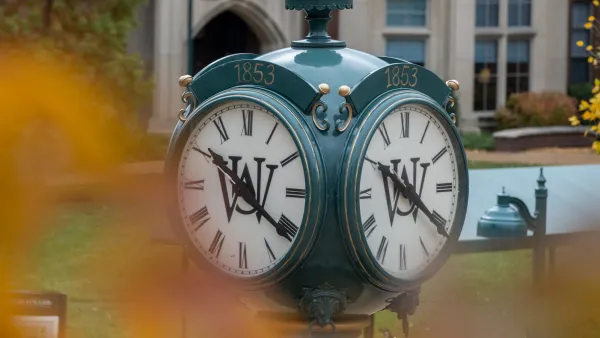Summer writing retreat offered inspiration and companionship
For two weeks in late spring, the Center for the Humanities hosted Washington University’s first-ever scholarly writing retreat for faculty in the humanities. Modeled after the highly successful program at Lewis and Clark College in Portland, Ore., the retreat was designed by Erin McGlothlin, associate professor of Germanic languages and literatures, to help scholars get a jump-start on a productive, prolific summer break.
The first few weeks after Commencement can set the tone for the entire summer, McGlothlin says. “During the semester, you’re so busy that you can lose track of your project. Then, summer comes and you’re hit with a double whammy: You’re exhausted and you’re staring at a blank page. It can be really easy to fall into a hole instead of stepping up to the research.”
Drawing on her experience in summer 2013 at the Lewis and Clark writing retreat, McGlothlin put together a workshop that could foster the kind of success she had there. (She revised a proposal for a book that was accepted at Northwestern University Press.) “I left the retreat with the sense that I need to be conscious of my writing practice,” she says. “It doesn’t happen magically. Treating it like an exercise allows me to see the control I have over it. It doesn’t control me.”
Starting in late May and running through early June, the retreat’s 16 attendees — at all levels from graduate student to tenured faculty — met in the humanities center conference room for companionship, inspiration and productive writing. The daily schedule included solitary writing time, a short discussion on writing and planning and scheduled breaks.
Ervin Malakaj, a PhD candidate in Germanic languages and literatures, found the structured time — hour-long blocks split between 45 minutes of writing and 15 minutes of break — to be beneficial. “The time blocks are a great habit to develop,” he says, “because you can implement them anywhere at any time and not continue to convince yourself that only specific spaces and long periods of time are suitable for production.” During his two weeks, Malakaj outlined a dissertation chapter and wrote the introduction and first half of the first section of that chapter.
Gillian Russell, associate professor of philosophy, also found the scheduled writing time to be helpful. She made progress on her book on philosophical logic. “If you have to start writing at 10 a.m., it’s much harder to say to yourself, 'Oh, I can’t write all day; I’ll start this afternoon and just get this admin done now,’” she says. The knowledge that others expected her to be there was another motivating factor.
Getting away from the home and work offices — places with a lot of potential distractions — is part of the draw of open writing hours, McGlothlin says. “The humanities center offers neutral space, away from temptations,” she says. “It also offers camaraderie: It’s social even if you’re not socializing.”
Importantly, the retreat provided a rhythm to the summer, McGlothlin says. “I’ve been through this myself every year… Leisure and work time get so mixed together, especially during summer. I figured that I was feeling this way, maybe others were, too.”
McGlothlin was joined at the writing retreat by Venus Bivar, assistant professor in history; Letty Chen, associate professor in East Asian languages and cultures; Mary-Jean Cowell, associate professor in performing arts; Denise Gill, assistant professor in music; Marta Halina, PhD candidate in philosophy; Jennifer Kapszynski, associate professor in Germanic languages and literatures; Stephanie Kirk, associate professor in romance languages and literatures; Ervin Malakaj, PhD candidate in Germanic languages and literatures; Anne-Marie McManus, assistant professor in Jewish, Islamic, and Near Eastern languages and cultures; Heidi Pennington, post-doctoral fellow in English; Ryan Platte, assistant professor in classics; Gillian Russell, associate professor in philosophy; Elizabeth Schechter, assistant professor in philosophy; and Nick Tamarkin, PhD candidate in comparative literature.
Their feedback has been encouraging, McGlothlin says. “People who were here felt it was helpful. You could see the productivity,” she says.



